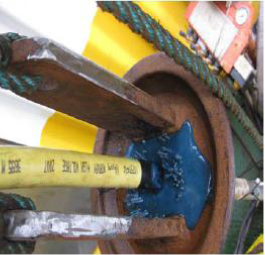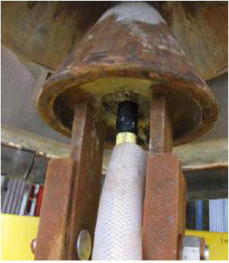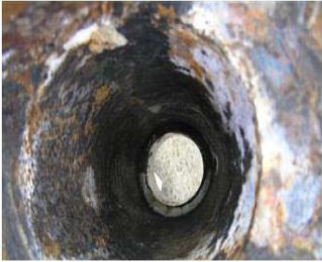Loss of ROV: dropped object
A member has reported an incident in which a remotely controlled vehicle (ROV) and its tether management system (TMS) were dropped to the seabed following failure of the umbilical termination. During recovery of the system, just as the bullet was about to enter the docking head in the A-frame, the umbilical separated from the TMS and both the ROV and its TMS were dropped to the seabed. Immediately after the incident occurred, all electrical power to the ROV was switched off and high voltage equipment was earthed according to procedure. The incident occurred three months after the latest umbilical re-termination.



An investigation found the following:
- The friction on the inner wall of the bullet was found to be greater than the combined friction of the strands, with the result that the cast was not able to be drawn down and wedged properly;
- During the investigation it also became clear that the relevant checkpoint in the maintenance programme was not detailed enough.
The root causes of the incident were determined to be:
- Friction on the inner wall of the bullet was greater than the combined friction of the strands;
- An important quality control checkpoint lacked clear, and easy to follow, instructions.
The following corrective actions were made:
- A new maintenance checkpoint task was added for inspecting the armour strands for any signs of being pulled through the potting;
- Pictures of the cast structure of the company’s entire ROV fleet were initiated immediately following this incident, for further review and technical analysis;
- Further pictures of the cast structure of every ROV system would be taken on a frequent basis;
- All bullets made of carbon steel would be changed out and replaced with a new type of bullet made of stainless steel. This would eliminate corrosion and friction to the inner walls of bullet.
Safety Event
Published: 22 December 2009
Download: IMCA SF 18/09
IMCA Safety Flashes
Submit a Report
IMCA Safety Flashes summarise key safety matters and incidents, allowing lessons to be more easily learnt for the benefit of all. The effectiveness of the IMCA Safety Flash system depends on Members sharing information and so avoiding repeat incidents. Please consider adding safetyreports@imca-int.com to your internal distribution list for safety alerts or manually submitting information on incidents you consider may be relevant. All information is anonymised or sanitised, as appropriate.
IMCA’s store terms and conditions (https://www.imca-int.com/legal-notices/terms/) apply to all downloads from IMCA’s website, including this document.
IMCA makes every effort to ensure the accuracy and reliability of the data contained in the documents it publishes, but IMCA shall not be liable for any guidance and/or recommendation and/or statement herein contained. The information contained in this document does not fulfil or replace any individual’s or Member's legal, regulatory or other duties or obligations in respect of their operations. Individuals and Members remain solely responsible for the safe, lawful and proper conduct of their operations.
